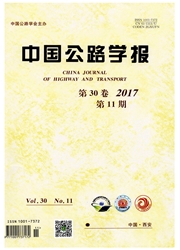

 中文摘要:
中文摘要:
为了给寒区钢管混凝土结构的设计与施工提供参考,针对拱桥拱肋或桥墩中普遍采用的钢管混凝土,考虑冻融循环次数、核心混凝土立方体抗压强度等因素的影响,进行了冻融循环作用后钢管混凝土轴压短柱的试验研究。基于试验结果分析,提出了冻融循环作用后核心混凝土的本构关系,同时利用该本构关系建立了冻融循环作用后钢管混凝土轴压短柱的有限元分析模型,并与试验结果进行对比。研究结果表明:冻融循环作用后钢管混凝土轴压短柱的破坏形态和荷载一应变曲线总体上与未遭受冻融循环作用试件类似,但试件的承载力和组合弹性模量随冻融循环次数的增加而减小;有限元理论模型的计算结果与试验结果总体吻合较好。
 英文摘要:
英文摘要:
In order to provide reference for design and construction of concrete-filled steel tubular structures in cold regions, aimed at concrete-filled steel tube (CFST) which has been widely adopted in ribs of arch bridges or piers of bridges, considering the influence of number of freezing and thawing cycles and cube compressive strength of core concrete, test study on CFST stubs after freezing and thawing exposure under axial loading was carried out. Based on the analysis of the test results, a constitutive relationship of core concrete after freezing and thawing exposure was proposed. A finite element analysis model for CFST stubs after freezing and thawing exposure under axial loading was developed and in the model the new constitutive relationship of core concrete was adopted. Analysis results and test results were compared. The results show that the failure mode and load versus deformation curve of CFST stubs after freezing and thawing exposure are similar to those of the reference specimens without being subjected to freezing and thawing; however, the bearing capacity and composite elastic modulus of CFST stubs decrease with the increase of number of freezing and thawing cycles. The predicted results by finite element analysis model are generally agreed well with the measured results.
 同期刊论文项目
同期刊论文项目
 同项目期刊论文
同项目期刊论文
 Experimental behaviour of recycled aggregate concrete filled stainless steel tube stub columns and b
Experimental behaviour of recycled aggregate concrete filled stainless steel tube stub columns and b An efficient approach for frequency-domain and time-domain hydrodynamic analysis of dam-reservoir sy
An efficient approach for frequency-domain and time-domain hydrodynamic analysis of dam-reservoir sy Analysis of quadruple corner-cut ridged square waveguide using a scaled boundary finite element meth
Analysis of quadruple corner-cut ridged square waveguide using a scaled boundary finite element meth Short-Crested Waves Interaction with A Concentric Porous Cylinder System with Partially Porous Outer
Short-Crested Waves Interaction with A Concentric Porous Cylinder System with Partially Porous Outer A Three-Dimensional Model of the Effective Electromechanical Impedance for an Embedded PZT Transduce
A Three-Dimensional Model of the Effective Electromechanical Impedance for an Embedded PZT Transduce Associated Generalized Plasticity Framework for Modeling Gravelly Soils Considering Particle Breakag
Associated Generalized Plasticity Framework for Modeling Gravelly Soils Considering Particle Breakag Noise Smoothing for Structural Vibration Test Signals Using an Improved Wavelet Thresholding Techniq
Noise Smoothing for Structural Vibration Test Signals Using an Improved Wavelet Thresholding Techniq Bond behaviour of deformed bars in self-compacting lightweight concrete subjected to lateral pressur
Bond behaviour of deformed bars in self-compacting lightweight concrete subjected to lateral pressur ANSYS implementation of damping solvent stepwise extraction method for nonlinear seismic analysis of
ANSYS implementation of damping solvent stepwise extraction method for nonlinear seismic analysis of High frequency S wave envelope synthesis using a multiple nonisotropic scattering model: application
High frequency S wave envelope synthesis using a multiple nonisotropic scattering model: application Seismic Response of Single-Degree-of-Freedom Systems Representing Low-Ductility Steel Concentrically
Seismic Response of Single-Degree-of-Freedom Systems Representing Low-Ductility Steel Concentrically Scaled boundary FEM solution of short-crested wave interaction with a concentric structure with doub
Scaled boundary FEM solution of short-crested wave interaction with a concentric structure with doub Dynamic interaction numerical models in the time domain based on the high performance scaled boundar
Dynamic interaction numerical models in the time domain based on the high performance scaled boundar A precise integration approach for dynamic impedance of rigid strip footing on arbitrary anisotropic
A precise integration approach for dynamic impedance of rigid strip footing on arbitrary anisotropic The First-Order Symplectic Euler Method for Simulation of GPR Wave Propagation in Pavement Structure
The First-Order Symplectic Euler Method for Simulation of GPR Wave Propagation in Pavement Structure Symplectic partitioned Runge-Kutta methods for two-dimensional numerical model of ground penetrating
Symplectic partitioned Runge-Kutta methods for two-dimensional numerical model of ground penetrating Short-crested waves interaction with a concentric cylindrical structure with double-layered perforat
Short-crested waves interaction with a concentric cylindrical structure with double-layered perforat An experimental study on the performance of self-compacting lightweight concrete exposed to elevated
An experimental study on the performance of self-compacting lightweight concrete exposed to elevated Numerical assessment of liquefaction mitigation effects on residential houses: Case histories of the
Numerical assessment of liquefaction mitigation effects on residential houses: Case histories of the Three-dimensional investigation of wave-pile group interaction using the scaled boundary finite elem
Three-dimensional investigation of wave-pile group interaction using the scaled boundary finite elem Structural Health Monitoring of a Tall Building during Construction with Fiber Bragg Grating Sensors
Structural Health Monitoring of a Tall Building during Construction with Fiber Bragg Grating Sensors Numerical analysis of dislocations of the face slabs of the Zipingpu Concrete Faced Rockfill Dam dur
Numerical analysis of dislocations of the face slabs of the Zipingpu Concrete Faced Rockfill Dam dur A coupled thermo-hydrologic-mechanical damage model and associated application in a stability analys
A coupled thermo-hydrologic-mechanical damage model and associated application in a stability analys Comments on placement of sensors in operational modal analysis for truss bridges in Mechanical Syste
Comments on placement of sensors in operational modal analysis for truss bridges in Mechanical Syste Experimental Study on Bond Behavior of Deformed Bars Embedded in Concrete Subjected to Biaxial Later
Experimental Study on Bond Behavior of Deformed Bars Embedded in Concrete Subjected to Biaxial Later Numerical modelling of wave interaction with a concentric cylindrical system with an arc-shaped poro
Numerical modelling of wave interaction with a concentric cylindrical system with an arc-shaped poro Sensor placement optimisation for Dalian international trade mansion focusing on application demands
Sensor placement optimisation for Dalian international trade mansion focusing on application demands Study on crack curving and branching mechanism in quasi-brittle materials under dynamic biaxial load
Study on crack curving and branching mechanism in quasi-brittle materials under dynamic biaxial load Experiment and modeling on axial behavior of carbon fiber reinforced polymer confined concrete cylin
Experiment and modeling on axial behavior of carbon fiber reinforced polymer confined concrete cylin 期刊信息
期刊信息
